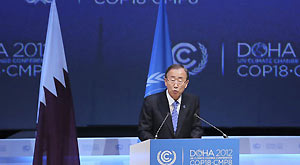Doha Talks End with Slight Progress
China Daily, December 10, 2012 Adjust font size:
The two-week UN climate conference in Doha ended on Saturday after 24 hours of extended negotiations with a package of deals that some participants said were disappointing but acceptable.
The conference was due to finish on Friday but remained unpredictable through Saturday evening, due to the demands made by Russia, Ukraine and Belarus on the issue of excess emissions allowances.
Within minutes of beginning the final plenary session, Abdullah bin Hamad Al-Attiyah, the Qatari president of the conference, said the Doha package deal, called the Doha Climate Gateway, had been adopted.
The wrangles of the past two weeks were resolved, but as UN Secretary-General Ban Ki-moon said in a statement on Saturday, "More needs to be done".
Xie Zhenhua, China's top climate change official, said after the meeting, "The Doha conference has met Chinese delegate's expectations, and we are satisfied with the outcome".
But there were disappointing aspects, Xie said.
China will follow a low-carbon path and contribute to fighting climate change on the basis of equal and common but differentiated responsibilities and capabilities while pursuing sustainable development, he said.
Working closely with other BASIC countries ― Brazil, India, South Africa and China ― Beijing played an active and constructive role in the meetings, Xie said.
He called on developed economies to be more ambitious in cutting greenhouse gas emissions and raise the money needed to help developing economies address climate change.
The United States and the European Union agreed to the deal with reservations.
"The work is definitely not perfect, but it's a modest and important step in the right direction," said Connie Hedegaard, EU climate chief.
Delegates from small island states were unhappy with the deal.
"Finance was missing in Durban, and it remains missing in Doha," said a representative from Nauru, which leads the Alliance of Small Island States.
The final document "encourages" developed economies to put up at least US$10 billion a year up to 2020, the same annual amount as the Fast Start Finance but not more.
"That's very disappointing," said Martin Khor, executive director of the South Center, an intergovernmental organization of 52 developing economies that also holds observer status at the United Nations.


